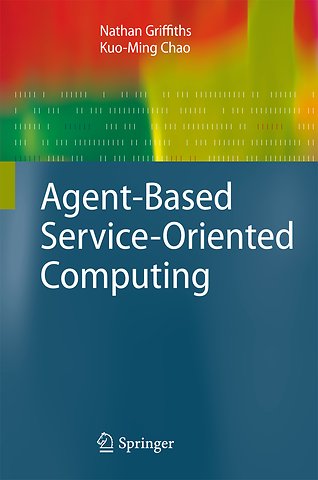Agent-Based Service-Oriented Computing
Paperback Engels 2012 2010e druk 9781447125341Samenvatting
Service-Oriented Computing (SOC) allows software development time to be shortened by the composition of existing services across the Internet. Further exploitation of this revolutionary trend is feasible through automation, thanks to the use of software agents and techniques from distributed artificial intelligence.
This book provides an overview of the related technologies and insight into state-of-the art research results in the field. The topics discussed cover the various stages in the life cycle of service-oriented software development using agent technologies to automate the development process and to manage services in a dynamic environment. The book presents both academic research results and the latest developments from industry.
Researchers from academia and industry, as well as postgraduates, will find this cutting-edge volume indispensable in order to gain understanding of the issues associated with agent-based service-oriented computing along with recent, and likely future technology trends.
Specificaties
Lezersrecensies
Inhoudsopgave
1.1 Distributed Systems
1.2 Software Agent
1.3 Service-Oriented Architecture
1.4 Modelling Methodologies
1.5 Supporting Development Platform
1.6 Agents and SOA Standards
1.7 Overview of Chapters
1.8 Conclusion
2. Service Advertisement and Discovery
2.1 Introduction to Service Advertisement and Discovery
2.2 Basic Technologies
2.3 Web service registry architectures
2.4 Data Structures
2.5 System Requirements
2.6 Advertisement and Discovery Services
2.7 Agents in Service Advertisement and Discovery
2.8 Challenges in Service Advertisement and Discovery
2.9 Summary
3. Multi-Agent Coordination for Service Composition
3.1 Introduction
3.2 Preliminaries
3.3 Related Work
3.4 Architecture of MQSC
3.5 Service Composition Generation
3.6 Service Composition Deployment and Execution
3.7 Case Study
3.8 Conclusion and Future Work
4. Flexible Workflow Management in Service Oriented Environments
4.1 Introduction
4.2 Orchestration and Choreography
4.3 Workflow and Web Services
4.4 The Role of Agents in Service-Based Business Processes
4.5 Dynamic Workflows
4.6 Summary and Outlook
5. Semantics for Service-Oriented Architectures
5.1 Introduction
5.2 Web Services and SOA
5.3 Semantic Web Services
5.4 Semantic Techniques for Automating SOA
5.5 Conclusions and Outlook
6. Dependability in Service-Oriented Computing
6.1 Introduction
6.2 Service-Oriented Architecture
6.3 Models
6.4 Dependability Enhancement in a Service-Oriented Architecture
6.5 Dependability Evaluation
6.6 Case Studies
6.7 Conclusions
7. Consensus Issues for Service Advertisement and Selection
7.1 Introduction
7.2 Existing Solutions for Web Service Selection
7.3 The Proposed QoS-aware Services Selection Model
7.4 Two Numerical Cases
7.5 Discussion
7.6 Conclusion
8. Trust and Reputation
8.1 Introduction
8.2 Trust and Reputation
8.3 Agents and Service-Oriented Computing
8.4 Trust Classes and Ontologies
8.5 Summary
9. QoS-Aware Service Selection
9.1 Introduction
9.2 Service Selection Procedure
9.3 Case Study - Selection of Switching Service
9.4 Performance Evaluation
9.5 The Selection of Switching Services
9.6 Summary
10. Future Directions
10.1 Introduction
10.2 Trust and Reputation
10.3 Contract-based Systems
10.4 Service Accountability
Rubrieken
- advisering
- algemeen management
- coaching en trainen
- communicatie en media
- economie
- financieel management
- inkoop en logistiek
- internet en social media
- it-management / ict
- juridisch
- leiderschap
- marketing
- mens en maatschappij
- non-profit
- ondernemen
- organisatiekunde
- personal finance
- personeelsmanagement
- persoonlijke effectiviteit
- projectmanagement
- psychologie
- reclame en verkoop
- strategisch management
- verandermanagement
- werk en loopbaan

